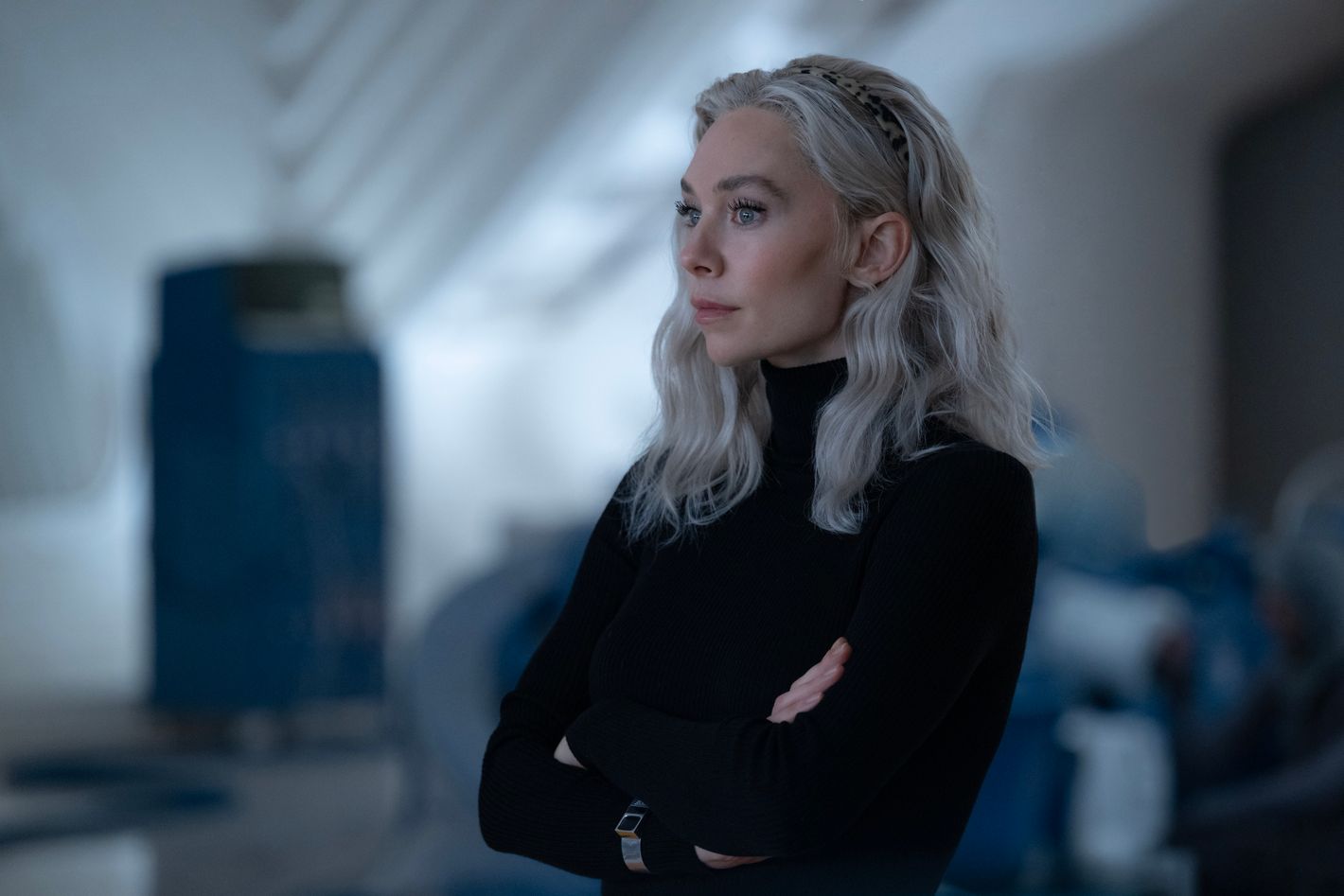
Slick with a 1960s retro-futuristic sheen, Marvel’s The Fantastic Four: First Steps is zippy and airy and asks little of its audience. It tells a genial story with threadbare characters. Sue Storm (Vanessa Kirby) is the exception, the most well rounded of the leading heroes, who are four years into their career of superheroics in the aftermath of a space flight that granted them awe-inducing abilities. Sue is emotionally intelligent and forthright. She navigates her celebrity and powers with aplomb. And the strength of her powers, including invisibility, far outstrips her peers. It is Sue who goes toe-to-toe with the movie’s planet-consuming villain, Galactus, in a spectacle of ferocious maternal instinct. That Sue is by far the most compelling character to watch, however, accentuates how poorly developed the rest of them are.
What separates Sue from her family-team is that she is given actual personality traits. The rest of the crew are lucky to carry a single trait at all. Ben Grimm, a.k.a. the Thing (Ebon Moss-Bachrach), is strong, is a great pilot, and has a nascent flirtation with Natasha Lyonne, a neighborhood fixture in the area of New York City where Ben grew up. Any sorrow the character has demonstrated in other Fantastic Four adaptations over the changes to his body is jettisoned in favor of nothing at all. Johnny Storm, a.k.a. the Human Torch (Joseph Quinn, with shocking blond hair and unnaturally blue eyes), is flirtatious and jokey. Reed Richards (Pedro Pascal) is considered the most intelligent man in the world. That’s it. When he says to his young son, “There’s something wrong with me. Always has been,” it feels disconnected from everything else we’ve seen of the character. What is he even talking about?
These aren’t characters. They aren’t even ambulatory ideas. The film is tasked with renewing people’s interest in Marvel films after a few uneven years of output, and thus it is focus-grouped within an inch of its life. Crucial conflicts are resolved quickly. Around halfway through the film, for example, the global public learn they may die brutally because Sue and Reed refuse to give up their infant son, Franklin, to Galactus. Loosely defined protests break out, driven by righteous anger. A crowd forms around the Baxter Building the Fantastic Four call home. But all it takes is a single heartfelt monologue from Sue, the only character with clarity of purpose, to assuage them. Sue jumps into the fray of citizens and reporters to defend the decision. The crowd parts as Sue, carrying Franklin in her arms, walks with an assured elegance, her face downright beatific. “That’s what family is. Fighting for something bigger than yourself,” she says, before noting the Fantastic Four’s commitment to saving their world. Soon, the faces of the angered New York City citizens around her soften. Given that Sue doesn’t explain how the team will save the planet, nor do they reckon with the gravity of their decision to potentially sacrifice billions of people for their only child, this is a wildly unbelievable moment.
It is only plausible in the Fantastic Four universe due to the comics’ continued interest in the power of the nuclear family. There is nothing the world loves to put on a pedestal more than a beautiful white mother who inhabits the cross section of feminine beauty and maternal warmth, and who demonstrates ease at inhabiting all the roles society asks her to fill. (In addition to being a superhero, Sue helps run a foundation and has an active role in United Nations negotiations and disarmament discussions.) But it’s also a testament to Kirby’s performance that she’s able to sell any of it. Her strength is in finding human moments — surprising Ben Grimm by becoming visible right next to him in a way that feels sweet and down to earth. She prods Johnny with the camaraderie beloved siblings share. Her desire to protect her son comes from a place of fear and anger, but what anger she inhabits never becomes a roaring flame. Kirby approaches it from a softer place of love. It’s one of the few forms of women’s anger that Hollywood approves of, of a piece with the film’s frictionless approach of 1960s Americana.
By the end of the film, the world — from government powers to common citizens — comes together with unquestioning alacrity to help build teleportation devices in an effort to save the Earth by relocating it. This is meant to be a moving display of worldwide unity. But it scans more as an argument for the nuclear family and the worth of (white) motherhood. In a final act of motherly sacrifice, Sue dies trying to defeat Galactus before quickly being brought back to life by her son. The film ends with this Marvel family prepping for a television appearance much like what opened the film. Their efforts are interrupted when they need to save the day elsewhere. Before they jet off in their flying car, they struggle to set Franklin’s car seat properly in front of the crackling bulbs of photographers and their adoring fans on the street outside the TV studio. What’s evident is that their family — and Sue’s image as a committed and powerful mother — is more than a personally held experience. It’s a brand they sell everywhere they go.
